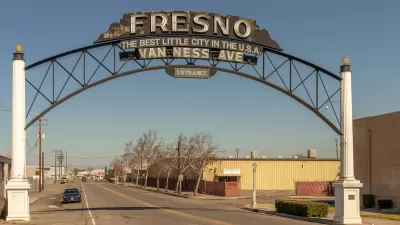The High Speed Rail Authority received a key approval from the Federal Railroad Administration to begin construction in California's Central Valley, specifically the 60-mile Merced to Fresno stretch. The remaining hurdles are several lawsuits.
Construction will begin on the 60-mile stretch between Fresno and Merced, known technically as the Initial Construction Segment. It will be funded with $2.6 billion in Prop 1A, 2008 state High Speed Rail (HSR) bonds and $3.2 billion from the federal government, a substantial part of which comes from stimulus funds rejected by the governors of Ohio, Wisconsin and Florida who opposed the high speed rail grants that their predecessors had successfully applied for.
Tim Sheehan of the Fresno Bee reports on the landmark approval.
"Backers of the project hailed the decision as historic for the development of the first high-speed train project in the nation and the start of construction in the central San Joaquin Valley. 'With the federal record of decision, we are now poised to move forward and break ground next year,' said Jeff Morales, the CEO of the High Speed Rail Authority (HSRA)..
"But the specter of lawsuits continues to hang over the project. Several have been filed against the rail authority in hopes of stalling or stopping work on the Merced-Fresno section.
The decision comes despite recent pleas from critics asking the federal authority to withhold approval based on concerns over "environmental justice" in the environmental review process, potentially in violation of the National Environmental Policy Act."
Also writing on the approval is Juliet Williams of the Associated Press who reports that the plan is now in compliance with "dozens of federal regulations, including the:
- Endangered Species Act
- Fish and Wildlife regulations
- National Historic Preservation Act"
Many of the lawsuits are coming from Central Valley farmers who oppose the project.
"We're not seeking necessarily to stop the project entirely, but we do think the project should be stopped until some of these environmental issues, and their severity, are addressed," said Anja Raudabaugh, executive director of the Madera County Farm Bureau.
Thanks to Streetsblog San Francisco
FULL STORY: Federal OK for high-speed rail

Planetizen Federal Action Tracker
A weekly monitor of how Trump’s orders and actions are impacting planners and planning in America.

Maui's Vacation Rental Debate Turns Ugly
Verbal attacks, misinformation campaigns and fistfights plague a high-stakes debate to convert thousands of vacation rentals into long-term housing.

San Francisco Suspends Traffic Calming Amidst Record Deaths
Citing “a challenging fiscal landscape,” the city will cease the program on the heels of 42 traffic deaths, including 24 pedestrians.

Defunct Pittsburgh Power Plant to Become Residential Tower
A decommissioned steam heat plant will be redeveloped into almost 100 affordable housing units.

Trump Prompts Restructuring of Transportation Research Board in “Unprecedented Overreach”
The TRB has eliminated more than half of its committees including those focused on climate, equity, and cities.

Amtrak Rolls Out New Orleans to Alabama “Mardi Gras” Train
The new service will operate morning and evening departures between Mobile and New Orleans.
Urban Design for Planners 1: Software Tools
This six-course series explores essential urban design concepts using open source software and equips planners with the tools they need to participate fully in the urban design process.
Planning for Universal Design
Learn the tools for implementing Universal Design in planning regulations.
Heyer Gruel & Associates PA
JM Goldson LLC
Custer County Colorado
City of Camden Redevelopment Agency
City of Astoria
Transportation Research & Education Center (TREC) at Portland State University
Jefferson Parish Government
Camden Redevelopment Agency
City of Claremont



























